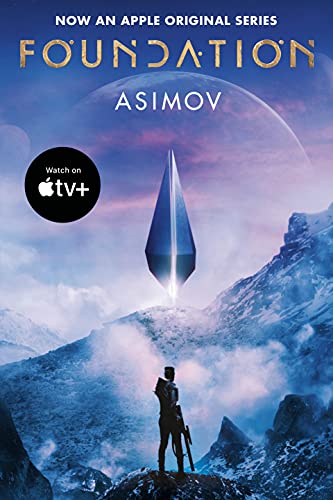Frank Herbert's “Dune” is often considered one of the most intricate and profound science fiction novels ever penned, blending themes including adventure, mysticism, politics, and environmentalism within an expansive universe. For those who have traversed the desolate sands of Arrakis and find themselves yearning for more, the search for books with a similar confluence of themes can be a daunting endeavor. In this exploration, we will discuss other books like “Dune,” each presenting a new cosmos to discover.
Books Like Dune
1. “Foundation” by Isaac Asimov
Isaac Asimov’s “Foundation” series is a cornerstone of science fiction, much like “Dune,” built on the sophisticated dynamics of societal evolution and the subtle manipulation of power. The saga begins with the psychohistorian Hari Seldon, who foresees the inevitable collapse of the Galactic Empire and devises a plan to curtail thousands of years of impending chaos to just a millennium. Readers will find the intricate political maneuvering and the elements of prophecy a thematic parallel to Herbert's masterpiece, providing a similarly epic narrative scope and a deep dive into the mechanics of power and civilization.
2. “Hyperion” by Dan Simmons
“Hyperion” weaves the tales of seven pilgrims journeying to a remote world, where they recount their personal histories. Echoing the setting and complexity of Dune, Simmons’ novel is celebrated for its elaborate world-building intertwined with multifaceted narratives and themes encompassing religion, politics, and the flow of time itself. This book is a masterclass in multi-narrative storytelling, mirroring Herbert's layered narrative and thematic depth.
3. “The Left Hand of Darkness” by Ursula K. Le Guin
In “The Left Hand of Darkness,” Ursula K. Le Guin presents an exploration of sociology and gender through the story of a planet whose inhabitants possess the unique ability to change their gender. This deep exploration of cultural complexity and political subterfuge, coupled with the emphasis on environmental impacts on societal evolution, reflect many of the pivotal themes found in “Dune.” Le Guin’s novel is a seminal work that challenges the norms of traditional science fiction just as Herbert’s work does, making it a must-read for those who appreciate the genre’s potential for deep social commentary.
4. “The Fifth Season” by N.K. Jemisin
This Hugo Award-winning entry in N.K. Jemisin's “Broken Earth” trilogy portrays a planet in the throes of apocalyptic climatic upheaval, centering on societal oppression and the extraordinary geological powers wielded by certain individuals. The novel's complex world-building and exploration of power dynamics and resistance strongly resonate with the themes Herbert explored in “Dune.” Jemisin’s narrative, rich with political intrigue and revolutionary fervor, parallels the tumultuous world of Arrakis, offering readers a visceral experience steeped in environmental and political turmoil.
5. “Neuromancer” by William Gibson
While “Neuromancer” exchanges the arid desert of “Dune” for the virtual labyrinths of cyberspace, its impact on the science fiction landscape is just as profound. William Gibson’s narrative, centered around a down-and-out computer hacker enlisted to execute the ultimate hack, complements the deep political intrigue and exploration of human versus technology themes found in “Dune.” Gibson’s seminal work pioneered the cyberpunk genre and offers a complex, neon-lit commentary on technology’s role in society.
6. “The Dispossessed” by Ursula K. Le Guin
Ursula K. Le Guin's “The Dispossessed” stands out as a profound philosophical narrative, depicting the lives of two planets starkly divided by conflicting ideologies—one embracing anarchy and the other a hierarchal capitalist society. This novel explores the philosophical and physical separations between their societies through the eyes of Shevek, a brilliant physicist who struggles with his identity and beliefs amidst these divides. The exploration of societal constructs and the protagonist’s deep introspective journey into his own philosophies and the surrounding world mirror the complex social fabric and the nuanced exploration of individual agency and morality found in “Dune.”
7. “Stranger in a Strange Land” by Robert A. Heinlein
Robert A. Heinlein’s “Stranger in a Strange Land” chronicles the life of Valentine Michael Smith, a human raised on Mars who returns to Earth, bringing with him a Martian perspective that challenges Earth’s established cultural and religious norms. This novel’s sharp critique of societal structures, human nature, and the fluidity of belief systems offers a rich thematic resonance with the intricate examination of religion and power dynamics in “Dune.” Heinlein’s narrative probes deeply into what it means to be human and the ways our cultures and environments shape us, themes heavily echoed in Frank Herbert’s iconic work.
8. “The Forever War” by Joe Haldeman
“The Forever War” by Joe Haldeman is a compelling military science fiction novel that parallels “Dune” in its exploration of the relentless nature of war and its profound effect on personal identity. Following soldier William Mandella, who is sent to fight an interstellar war, the novel explores time dilation and its alienating effects from society, as Mandella finds the Earth he returns to after each mission drastically changed. This poignant portrayal of the futility of war and its deep psychological impacts on those involved reflects the transformation of Paul Atreides and the overarching theme of cyclical conflict seen in “Dune.”
9. “Children of Time” by Adrian Tchaikovsky
Adrian Tchaikovsky's “Children of Time” is an innovative foray into the evolution of intelligence, centering on a terraformed planet where spiders evolve into the dominant species under the guidance of the last vestiges of human technology. The novel intricately explores themes of civilization development, survival against all odds, and the complex interactions between different species—themes that resonate with the ecological and historical contexts explored in “Dune.” Tchaikovsky crafts a narrative that questions the nature of progress and the essence of being, through a lens distinctly reminiscent of Herbert’s thematic concerns.
10. “Grass” by Sheri S. Tepper
Sheri S. Tepper’s “Grass,” set on a planet dominated by endless grasslands, follows a noble family as they uncover the sinister realities behind a mysterious plague affecting all worlds but their own. The novel’s exploration of ecological dynamics, coupled with the social stratification and the existential threats facing humanity, shares much with the portrayal of Arrakis and its own set of ecological and societal challenges. Tepper, much like Herbert, weaves complex social commentary into a rich environmental backdrop, making “Grass” a compelling read for those who appreciate the deep ecological insights and intricate plot constructions of “Dune.”
Each of these novels embodies the monumental scope and thematic complexity that Frank Herbert masterfully demonstrated in “Dune,” and expands on these ideas, offering new interpretations and profound insights into human nature, societal evolution, and the interaction between environment and civilization. Whether it's through the digital realms of “Neuromancer,” the shifting genders of “The Left Hand of Darkness,” or the elaborate societal constructs of “Foundation,” these books provide a continuation of the worlds that fans of “Dune” are sure to appreciate.















